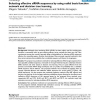Free Online Productivity Tools
i2Speak
i2Symbol
i2OCR
iTex2Img
iWeb2Print
iWeb2Shot
i2Type
iPdf2Split
iPdf2Merge
i2Bopomofo
i2Arabic
i2Style
i2Image
i2PDF
iLatex2Rtf
Sci2ools
125
click to vote
BMCBI
2006
2006
Selecting effective siRNA sequences by using radial basis function network and decision tree learning
Background: Although short interfering RNA (siRNA) has been widely used for studying gene functions in mammalian cells, its gene silencing efficacy varies markedly and there are only a few consistencies among the recently reported design rules/guidelines for selecting siRNA sequences effective for mammalian genes. Another shortcoming of the previously reported methods is that they cannot estimate the probability that a candidate sequence will silence the target gene. Results: We propose two prediction methods for selecting effective siRNA target sequences from many possible candidate sequences, one based on the supervised learning of a radial basis function (RBF) network and other based on decision tree learning. They are quite different from the previous score-based siRNA design techniques and can predict the probability that a candidate siRNA sequence will be effective. The proposed methods were evaluated by applying them to recently reported effective and ineffective siRNA sequence...
Related Content
| Added | 10 Dec 2010 |
| Updated | 10 Dec 2010 |
| Type | Journal |
| Year | 2006 |
| Where | BMCBI |
| Authors | Shigeru Takasaki, Yoshihiro Kawamura, Akihiko Konagaya |
Comments (0)

